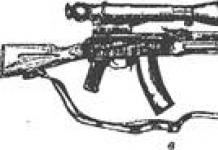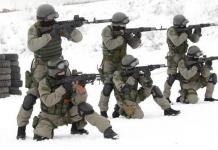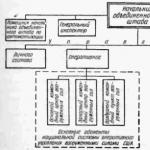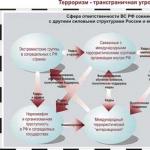These are the rules for pronunciation of vowels and consonants.
The pronunciation norms of the modern Russian literary language have evolved over the centuries, changing. So, for example, in Ancient Russia the entire population who spoke Russian was okalo, i.e. pronounced the sound [o] not only under stress, but also in unstressed syllables (just as it happens today in the dialect dialects of the North and Siberia: in [o] yes, dr[o] wa, p[o] go etc.). However, okanye did not become the norm of the national Russian literary language. What prevented this? Changes in the composition of the Moscow population. Moscow in the XVI-XVIII centuries. accepted many immigrants from the southern provinces and absorbed the features of the southern Russian pronunciation, in particular akanye: in [a] yes, dr[a] wa, n[a] go. And this happened just at the time when solid foundations single literary language.
Since Moscow and subsequently St. Petersburg were the capitals of the Russian state, the centers of the economic, political and cultural life of Russia, it turned out that the Moscow pronunciation was taken as the basis for the literary pronunciation, on which some features of the St.
For successful mastering of orthoepic norms it is necessary:
1) learn the basic rules of Russian literary pronunciation;
2) learn to listen to your speech and the speech of others;
3) listen and study exemplary literary pronunciation, which radio and television announcers, masters of artistic word;
4) consciously compare their pronunciation with exemplary, analyze their mistakes and shortcomings;
5) correct mistakes by constant speech training in preparation for public speaking.
The complete style is characterized by:
1) compliance with the requirements of orthoepic norms;
2) clarity and distinctness of pronunciation;
3) the correct arrangement of verbal and logical stress;
4) moderate pace;
5) correct speech pauses;
6) neutral intonation.
With an incomplete pronunciation style, there is:
1) excessive reduction of words, loss of consonants and whole syllables, for example: right now (now), thousand (thousand), kilogram tomato(kilograms of tomatoes), etc.;
2) indistinct pronunciation of individual sounds and combinations;
3) inconsistent pace of speech, unwanted pauses.
If in everyday speech these features of pronunciation are acceptable, then in public speaking they must be avoided.
Some difficult cases of pronunciation of vowels and consonants
Pronunciation of vowels
In some words of foreign origin in place unstressed spelling "o" instead of a sound close in pronunciation to [a], the sound is pronounced [o]: beau monde, trio, boa, cocoa, biostimulant, advice note, oasis, reputation. The pronunciation of the words poetry, credo, etc. with unstressed [o] is optional. Proper names of foreign origin also retain unstressed [o] as a variant of literary pronunciation: Chopin, Voltaire, etc.
In the pronunciation of a number of words such as scam, guardianship, grenadier, fur, faded etc. difficulties arise due to the indistinguishability in the printed text of the letters e / e, since only one graphic symbol is used to designate them - e. This situation leads to a distortion of the phonetic appearance of the word, causes frequent pronunciation errors.
List of words with a stressed vowel [e]:
af e ra
breve started
being
head shka
holole ditsa
bittersweet
grenada
single, different, one, tribal (but: many, different tribes)
life
expired (year); but: bleed out
Kiev-Pechersk Lavra
perplexed
guardianship
axis long
produced
List of words with a stressed vowel [o]:
bl yo kly
lie; zhe lchny (additional [zhe])
same forehead
oblivion
manyo vr; maneuverability
I'm useless
of the same name
point
named
shadow that
alkali
Pronunciation of consonants
According to old Moscow norms, the spelling combination -ch- was pronounced like [shn] in the words bulo tea, purposely, penny, trifle, creamy, apple and others. At present, the pronunciation [shn] has been preserved only in some words: horse chno, boring, scrambled eggs, eyeglass, mustard, trifling, birdhouse, bachelorette party. In the vast majority of other words, in place of the letter combination -ch- it is pronounced [h’n]: toy chny, creamy, apple, diner, wine glass etc. In addition, according to the norms of the Russian literary language, the combination of letters -ch- has always been pronounced and pronounced like [ch'n] in words of book origin, for example: al chny, eternity, careless, as well as in words that have recently appeared in Russian: otli black hat, camouflage and etc.
The pronunciation [shn] is preserved today in female patronymics ending in -ichna: Nikiti chn a, Ilyinich a etc.
The letter combination -th- in the word that and in its derivatives is pronounced like [pcs]: [pcs] oby, something [pcs] about, [pcs] about anything, none [pcs] about. In the word something sounds [h't].
Combinations of letters zhzh and zzh can be pronounced as a long soft sound [zh’zh ’] in accordance with the old Moscow pronunciation: in [zh’zh ’] and, dro [zh’zh ’] and, later - after [zh’zh ’] e etc. However, at present, soft [zh’zh ’] in such words is being replaced by hard [lzh]: in [lj] and, dro [lj] and, later - after [lj] e and others. Soft long [zh’zh ’] is recommended for stage, as well as radio and television speech.
In the pronunciation of the word rain, the variant predominates [PCS'] while remaining, but obsolete to [sh’sh’]. In other forms of this word in modern Russian, the sound combination [zhd '] was fixed: before [wait '] I, until [wait '] and.
Pronunciation of loanwords
When pronouncing some foreign words, erroneous extra consonants or vowels sometimes appear. Should be pronounced:
incident (not incident[n] dent)
precedent (not precedent)
dermatin (not dermat[n] tin)
to compromise (not to compromise)
competitive (not competitive [n] able)
extraordinary (not h[e] extraordinary)
institution (non-educational)
future (not future)
thirsty (not thirsty)
In the position before the sound [e], denoted in writing by the letter e, both soft and hard consonants are pronounced in borrowed words, for example: detective - [dete] active, academy - aka [d'e] miya.
The lack of softness is more often characteristic of dental consonants d, t, z, s, n and consonant r, for example: fo [ne] tika, [re] quiem. However, in borrowed words fully mastered by the Russian language, these consonants are pronounced softly in accordance with the tradition of the Russian letter e to denote the softness of the preceding consonant sound: mu ze y, te rmin, tire l and etc.
Memorize the pronunciation following words!
List of words with softly pronounced consonants before E (aka [d'e] miya, [b'er'e] t and etc.):
ag re ssia
academy
disinfection
de prescia
de can [d "e] and [de]
de fis
competence
congre ss
museum
Ode ssa
patent nt
press
pre ssing
progress ss
se yf
service
session [s "e] and [se]
those rmin
federal
tire
express ss
jurisprudence
List of words with strongly pronounced consonants before E (a [de] pt, [dete] rminism and etc.):
a inadequate
antise ptik
atheism
business with, business change
sandwich
degradation
de qualification
decollete
de cor
de mping
childism
dispensary
indexing
a computer
conse nsus
manager (add. [m "ene])
nonce ns
parte p
pretentious
producer
protection
rating
requiem
str ss
those sis
those mbr
those mp
trend
thermos
extras ns
energy
P.S. In borrowed words beginning with prefixes de- before vowels, dez-, as well as in the first part of compound words beginning with neo-, with a general tendency to soften, there are fluctuations in the pronunciation of soft and hard d and n:
devaluation [d "e and de]
misinformation [d "e and de]
neo-colonialism [neo and add. n "eo]
AT foreign proper names recommended solid pronunciation consonants before e: Descartes, Flaubert, De Cameron, Rembrandt and etc.
Solid [sh] is pronounced in words parachute [shu], brochure [shu]. The word of the jury is pronounced soft sizzling [zh"]. The names Julien, Jules are also softly pronounced.
Topic: The main rules of Russian orthoepy. Intonation.
Goals and tasks:
give an idea of the subject of study of orthoepy;
to acquaint with the features of Russian stress;
introduce the concept of orthoepic norm;
summarize information about the features of the pronunciation of some sound combinations;
Developing:
develop cognitive abilities;
develop logical thinking (the ability to analyze, compare, generalize and identify the main thing);
develop the ability to coherently and competently express their thoughts;
Educational:
to form a respectful, careful attitude to the native language;
to form a sense of responsibility for the preservation of the Russian language as an integral part of the national culture;
influence the motivational sphere of the personality of students;
to form a skill rational use time;
Lesson progress
Org. moment
Announcement of goals and objectives, lesson plan. Formulation of the problem.
Frontal discussion with the class.
In "The Tale of the Dead Princess and the Seven Bogatyrs" A.S. Pushkin there is an episode that tells about the first meeting of the heroes with the princess, remember:
"The elder said:" What a marvel! Everything is so clean and beautiful. Someone tidied up the tower Yes, the owners were waiting. Who? Come out and show yourself, Be honest with us."
Did you notice that the princess in the forest tower of the heroes did not behave like the daughter of the king, but rather like a peasant girl?
"And the princess came down to them, Honored the hosts, Bowed low from the waist; Blushing, she apologized, She came to visit them, Although she was not invited."
But how did the heroes guess that the king's daughter was in front of them?
"In an instant, from the speech, they recognized that they received the princess:"
Conclusion: It turns out that sometimes it is enough to hear how a person speaks in order to understand who he is, what he is. It is the pronunciation that we will devote our lesson today. A studies this branch of linguisticsorthoepy. So we will consider the object of studying orthoepy, get acquainted with the features of Russian stress, with such a concept as the orthoepic norm; summarize information about the features of the pronunciation of some sound combinations; we systematize and generalize knowledge about the placement of stress in adjectives, verbs, and some participles. During the lecture, take brief notes to create reference materials for yourself that you can use in the following classes when completing tests.
III. Teacher lecture with conversation elements
Classification of norms of oral speech
Speech rules include:
Accent rules.
intonation norms.
Orthoepic pronunciation norms
Orthoepy - the system of pronunciation norms of the language.
[G] pronounced like[X] in combinations gk and hh (light - le [x] cue, lighter - le [x] che).
Assimilation when combinedssh, and zsh . They are pronounced like a long hard consonant.[w¯] (lower - not [shsh] y, highest - you [shsh] y, make a noise - ra[shsh] be able to)
Similar assimilation in combinationsSJ and Learn - [and] (unclench - ra [lzh]at, with life - [lzh] life, fry - [lzh] fry).
Combination MF and ZCH pronounced like [sch ] (happiness - [w] astier, score - [w] et), (prikazchik - prik [sh] ik, sample - obraz [sh] ik) .
Combinations PM and DC- how [h] (speaker - report [h] ik, pilot - le [h] k).
Combinations Tts and DC- how [ts ] (twenty - two [ts]at , gold - gold [ts] e).
Combinations PM and DC- how [h] (speaker - report [h] ik, pilot - le [h] ik).
Combinations Stn and Zdn - they have consonant soundst and d fall out (charming - charming, late - knowledgeable, honest - che [sn], sympathetic - teaching [sleep] ive).
9. In modern Russian pronunciation[SHN] considered obsolete, the norm -[H`N].
Combination CHN , usually pronounced according to the spelling(anti [h`n] yy, ve [h`n] yy, yes [h`n] yy, ka[h`n] ut, milky [h`n] yy, but [h`n] oh, different [h`n] oh, poro [h`n] yy, then [h`n] yy).
There are traditional deviations from the norm, legalized modern dictionaries and reference books.
Exception : In some words[sn] : kone[shn] o, sku[shn] o, naro[shn] o, yai[shn]itsa, empty[shn], square[shn]ik, laundry[shn]aya, Savvi[shn]a, Nikiti[ shn]a, Fomini[shn]a, etc.
double pronunciation allowed in the words:bulo [shn] ([ch]) th, drain [shn] ([ch]) th, yai [shn] ([ch]) th, sin [shn] ([ch]) left.
10. Combination Thu , basically the same as the pronunciation(ma[th]a, me[th]a, not [th]o, nothing [anything], after [th] and, about [th] and, at [th] and)
But: in union what and in the pronoun that (to, something, something) pronounced [PCS].
11. In reflexive verbs at the end is written– to be or – tsya , but pronounced the same[tsa]
12. Features of the transition [E] to [O] to modern language.
The general trend - the transition of E into O under stress after soft consonants (Russification).Whitish - whitish, crossbill - crossbill, firebrand - firebrand, faded - faded.
Along with this, there are numerous facts of conservation of [E](Expired, deadwood, guardianship, fishing line).
Words of foreign origin:
Softening consonants before E .
In accordance with the norms of pronunciation in Russian before a vowelE pronounced soft consonant : text [t´e], brunet [n´e], term [t´e] , specifically [r´e], therapist [t´e].
But usually in book words and terminology continues to be pronouncedwith a hard consonant (integral [te], tendency [te], artery [te], asepsis [se], phonetics [ne], Voltaire [te], Descartes [de], Chopin [pe], La Fontaine [te], steak [te] , scarf [ne], timbre [te], thermos [te]).
In many foreign words, after consonants, it is writtenE , and consonants are pronouncedfirmly (atelier [te], atheist [te], dandy [te], scarf [ne], cafe [fe], desk [te], resume [me], stand [te], masterpiece [she]).
But in a number of words, consonants are pronounced softly.(decade [d´e], academy [d´e], demagogue [d´e], museum [z´e], plywood [n´e], flannel [n´e])
A double consonant is pronounced double in one word (va [nn] a, ka [ss] a, ma [ss] a, cape [ll] a) , in others - like a single (neatly - a [k] hurriedly, accompaniment - a [k] accompaniment, chord - a [k] ord, allocate - a [s] ignore, gram - gra [m]).
Accentological norms/mistakes. The main trends in the development of stress norms.
Accent options:
Accent options – double stress :
Short list equal accentological options:apartments - apartments;
basilica - basilica;
barge - barge;
bijouterie - bijouterie;
delusional - delusional;
rustyAvet - rusty;
Otherwise - otherwise;
sparkle - sparkle;
kirza - kirza;
dropped - armored;
loop - loop;
meatballs - meatballs.
Semantic options - these are pairs of words in which the heterogeneity of stress is intendedto distinguish the meaning of words (homographs - the same in spelling, different in stress).
A short list of words that differ in their meaning depending on the stress:Book (assign something to someone) - book (cover with armor);
armor - armor;
busy (person) - busy (house);
salted (about vegetables) - salted (about soil);
sharpened (pencil) - sharpened (prisoner);
naked (cut) - naked (hold checkers);
bypass (leaf, path) - bypass (maneuver);
portable (radio receiver) - portable (value);
transitional (score) - transitional (age);
submerged (on the platform) – submerged (in water);
approximate (to something) - approximate (close);
draft (age) - draft (calling);
damned (cursed) - damned (hated);
developed (child) - developed (mentally) - developed (hair);
inclined (to something) - inclined (in front of someone);
folded (from details) - folded (having one or another physique);
chaos (in ancient Greek mythology) – chaos and chaos (disorder);
characteristic (person) - characteristic (act);
linguistic (verbal expression of thoughts) - linguistic (related to the organ in the oral cavity);
Bite (common word) - bite (special);
silk (common) - silk (poetic).
Normative-chronological options are pairs of words in which heterogeneity is associated withtime period the use of this word in speech:
Ukrainian (modern) - Ukrainian (obsolete);
angle (modern) - angle Urs (obsolete).
"Dictionary Words". Basic accentological norms.
Trends in norms at the place of stress:
nouns - tendency towardsmobile stress (folk language invades literary);
at verbs - trendanchoring accents onroot syllable (influence of South Russian dialects);
general trends - is detectedmultidirectional movement of the accent :
regressive - moving the stress from the last syllable to the beginning or closer to the beginning of the word;
progressive - moving the stress from the first syllable closer to the end of the word.
3. Intonation norms/mistakes.
Intonation - this is a rhythmic-melodic and logical articulation of speech.
Intonation is one of the means of expressive speech.
But the intonational norms in the Russian language concern, first of all,correct rise / fall / intonation towards the end of the sentence depending on the purpose of the statement and the correct setting of the logical stress in the phrase.
By the end declarative sentence intonation goes down.
Nurse Natasha had a very hard day today.
By the end of the interrogative sentence, the intonation, on the contrary, rises.
She's tired?
intonation errors.
1. Intonation errors are relatedwith wrong intonation (inappropriate increase or decrease in intonation).
2. In addition, intonation errors include:incorrect setting of pauses and logical stress. This often leads to a distortion of meaning, especially in poetic works, for example:
For example: Setting pauses.
Not properly: In the heavens / the earth sleeps solemnly and wonderfully / in the radiance of blue.
Correctly: In the heavens / solemnly and wonderfully / / the earth sleeps in a blue radiance.
IV. Orthoepic workout. ).
Key
1. When climbing stairs, hold on to the handrails. Go through the customs check. The customs office has already begun its work. A load divided by two is twice as light. After lifting the suitcase, place it on the conveyor. The expert, who understood his task, began to act. The train arrived at the station on time. Arriving at the place of destination, get your luggage.
Test yourself
1. When climbing stairs, hold on to the handrails. Have you passed customs clearance? Customs has already begun its work. A load divided by two is twice as light. After lifting the suitcase, place it on the transporter. The expert, who understood his task, began to act. The train arrived at the station on time. When you arrive at your destination, don't forget to collect your luggage.
V. Performing training exercises.
Exercise 1. Read correctly.
a)
live for / city,
climb on / mountain,
deliver to / house,
pull for / leg,
take under / arms,
walk on / forest.
b)
Alive - alive, alive, alive.
Right - right, right, right.
Pitiful, pitiful, pitiful, pitiful.
Green - green - green - green.
Tough - tough, tough, tough.
in)
Accepted - accepted, accepted, accepted.
Raised - lifted, lifted, lifted
Sold - sold, sold, sold.
Given - given, given, given.
Busy - busy, busy, busy.
V. Independent work (ex. ____)
VI . Teacher's word. In the first part of our lesson, we noted that the subject of the study of orthoepy is also "literarypronunciation of individual sounds and sound combinations. Let's pay attention to the pronunciation rules of some combinations. We will take them into account in everyday life.
1. Combinationmid orzch (at the junction of the root and the suffix starting with the letterh) usuallypronounced like a lettersch , that is, like a long soft [u"u"] - ra[u"u"] from, [u"u"] astute, different [u"u"] ik, sign [u"u"]ik, uka[ u "u"] ik.
2. In place of the letterG at the end-th (-his) the sound [in] is pronounced: big [in] o, blue [in] o, ko [in] o, th [in] o, second [in] o, other [in] o, revived [in] o. Consonant [in] in place of a letterG also pronounced in wordstoday, today, total .
3. The combination of consonants in verbs in-tsya and- be pronounced as double [ts].
4. Combinationch It has interesting story. "Back in the 18th century, the spelling combination ch was consistently pronounced as [shn], as evidenced by the phonetic spellings recorded in the dictionary of the Russian Academy (1789-1794): tie, cap, kopeeshny, lavoshnik, button, factory, etc. However, over time, this option begins to be supplanted by the pronunciation [h "n], which arose under the influence of writing. "Today, words with a combinationch are pronounced differently: 1) as a rule, the pronunciation corresponds to the spelling, that is, it is pronounced [h "n]:durable, country, eternal, start, swing ; 2) in some words in placech pronounced [shn], for example:of course, boring, on purpose, birdhouse, Savichna, Fominichna (the number of such words is decreasing); 3) in a number of cases today both options are considered normative - [h "n] and [shn], for example:candlestick, bakery, dairy (note that in some cases the pronunciation [shn] becomes obsolete:creamy, brown ). "AT individual cases pronunciation options delimit different lexical meanings:cordial [h "n] attack - friendcordial [shn];pepper pot [h "n] (pepper vessel) - damnpepper pot [shn] (about an evil, grumpy woman)."
5. "Combinationthu pronounced like [pcs] in a wordwhat and its derivative forms (something, something ). In the word something is pronounced [h "t], in the wordnothing both options are acceptable" [Ibid.].
6. "Fricative"[?] in the literary language is allowed in wordsOh God, accountant, yeah, by God, Lord .
7. The final [r] is replaced by the sound [k] (not [x]!): creative [k], dialogue [k], the exception is the wordGod [boh]". [Ibid.]
VII. Exercises for the pronunciation of individual sound combinations.
1. Read the given words aloud. Pay attention to the pronunciation of ch as [ch] or [sh]. In what cases is double pronunciation possible?
Bakery, mustard plaster, creamy, shopkeeper, comic, maid, milkmaid, of course, laundry, boring, match, penny, loser, bachelorette party, on purpose, bribe taker, trifling, decent, unprofitable, Ilyinichna.
2. Based on rhymes poetic texts taken from the works of A.S. Pushkin, determine the pronunciation of the combination of ch. How would you explain the discovered orthoepic phenomenon?
1.
On the winter road, boring
Troika greyhound runs
Bell is monophonic
Tiring noise.
2.
It's sad, Nina: my way is boring.
Dremlya fell silent my coachman,
The bell is monotonous
Foggy moon face.
VIII. Summarizing.
Pronunciation of vowel sounds:
Remember a few rules that reflect modern orthoepic norms.
Rule 1: letterG at the end of a wordGod pronounced like [x].
Rule 2: -th/-his in masculine and neuter adjectives are pronounced likeo [c] o / e [c] o.
Rule 3: zzh andszh pronounced like[and] (at the junction of morphemes or
official word with a significant one).
Rule 4: AF andmid pronounced like [w "] (at the junction of morphemes).
Rule 5: dh andpm pronounced like [h "] (at the junction of morphemes).
Rule 6; -tsya and- be pronounced like[ca] (in verbs).
Rule 7: ds andts pronounced like[c] (before k in adjectives).
Rule 8: train pronounced like[PCS"] and[w "] (in the word rain and derivatives). The pronunciation of such combinations in case of difficulties should be clarified in the spelling dictionary.
Rule 9: h pronounced like [h "n] - in most words, but pronounced like[sn] in wordsboring [shn] o, kone [shn] o, na-ro [shn] o, laundry [shn] aya, square [shn] ik, Ilyini [shn] a and etc.
Rule 10: Thu" pronounced like [pcs](for what etc.), butsomething [Thurs].
Rule 11: gk pronounced like [x "k"] - in wordslight, soft.
Rule 12: hh pronounced like [hh "] - in wordslighter, softer.
Rule 13: stn, ntsk, stl, ndsk, zdn, rdts, lnts, stv, lvs - contain
unpronounceable consonant. In case of difficulty, please contact
spelling dictionary.
Rule 14: double consonants in loanwords are pronounced
usually as a long consonant, but a number of words can be pronounced
double consonant as one sound(bath [n],flu [P]).
Rule 15: in an unstressed position, the sound [o] is not pronounced. After
hard consonants in the first pre-stressed syllable, as well as at the beginning of a word in
the place of the letter o is pronounced [a](kSchza -k [o \ zy, [writing - [o] writing).
Therefore, for example, they are pronounced the same way, with the sound [a], the wordsoxen and
shafts, catfish andherself, although spelled differently.
Homework.________ ex. ___________
Conversational speech is a kind of system that exists in parallel with book speech within the national language. One French linguist argued (and rightly!) that "we never speak the way we write, and we rarely write the way we speak." And the famous English writer B. Shaw was sure that "there are fifty ways to say" yes "and five hundred ways to say" no "and only one way to write it." One way or another, but the opposition of the two forms of language, oral and written, has sufficient grounds. We will not dwell on the features of everyday speech; but let's talk about something else - about the norms of literary stress and pronunciation, without which one cannot speak of literate speech in the full sense of the word.
Orthoepy called the doctrine of the normative pronunciation of the sounds of a given language, a set of rules of oral speech that establish the uniformity of literary pronunciation. This includes issues of stress and intonation, which are important for oral speech.
FROM loop or with no? aphids?The question asked in the title will be answered differently by everyone. Some will pronounce no? aphids(which is considered the norm, enshrined in most dictionaries), and others - (and most of them) - with loop.
Most often, fluctuations in stress are explained by the presence of two pronunciation options - book (traditional) and colloquial: ke?ta - keta?, curd? g - your? horn and etc.

The difficulties of Russian stress are connected, as you know, with two of its features. Firstly, it is ambiguous, not associated with a specific syllable in a word, as in some other languages. Secondly, it is mobile, i.e. can move from one syllable to another when changing (declension or conjugation) of the word. It hardly needs to be reminded that the skills to correctly place stress are an essential element of speech culture.
Coping with Russian stress is not easy, but difficulties must be overcome. If the stress in the initial form of many, many words has to be memorized (or checked by looking into reference dictionaries), then to determine the place of stress in the derivative forms of words of certain grammatical categories (for example, goose or goose?? re?ku or river??) have their own rules.
So, many monosyllabic masculine nouns have in the form of the genitive case singular accent on the end; bandage - bandage?, pancake - pancake?, bean - bean?, beaver - beaver?, screw - screw?, harm - harm? umbrella - umbrella ?, whale - whale ?, tuft - tuft ?, fang - fang ?, ladle - bucket ?, mole - mole ?, hook - hook ?, sack - sack ?, tench - tench ?, layer - layer ?, fruit - fruit?, sickle - sickle?, whitefish - whitefish?, stack - stack?, trace - trace? and etc.
Concerning goose, then there are two options for stress - and goose?, and goose. And there are many such words: pond? and pru? yes, rogue? and a cheat, wands? and also? evil, gruzdya? and heavy and etc.
Nouns female in the form of the accusative case of the singular, they have partly the stress on the ending, and partly on the basis:
1) trouble?, tops?, armor?(protective lining) , widow?, spring?, count?, gum?, length?, hole?, snake?, ash?, hut?, pick?, goat?, hole?, sheep?, alder?, saw?, stove? ?, dew?, rock?, saliva?, resin?, owl?, plow?, foot?, country?, stanza?, string?, grass? and etc.;
2) beard, mountain, do? sku, earth, winter, po? ru, sleep and etc.
A number of words have two options for stress: harrow and harrow ?, river and river ?, ke?tu and ketu? and etc.
With an accent on the ending, some monosyllabic feminine nouns of the 3rd declension are pronounced when used with prepositions in and on the in circumstance: in a handful?, on the chest?, in bones?, in blood?, in the night?, on the stove?, in connection?, in the steppe?, in the shade?, on a chain?, in honor? etc. However: on the door? and two? ri, in a cage? and in the cage and etc.
Part of 3rd declension nouns in the genitive form plural are pronounced with stress on the basis, and part - with stress on the ending:
1) eminences, stupidity, insolence, localities, shepherds, honors, profits, preaching, strands, cuts, joys, pranks;
2) branch? th, handful, position, pole? th, brush? th, fortress? th, blade? th, flat? th, square, tale, role, set, tablecloth, speed, degree, sterlet, shadow slot? etc. However, it is possible: about? Industries and industries? etc. Sometimes prepositions take on stress, and then the noun (or numeral) following them turns out to be unstressed: hour about hour, year about year; before? nights before? semi etc. Most often, the stress is pulled over by prepositions:
On the: on the? leg, on mountain, on hand, on back, on winter, on soul, huh? wall, on head, on side; on the? coast, on year, on house, on nose, on corner, on ear, on day, on night, tooth on? tooth; on the? two, on three, na? six, na? ten, huh? one hundred;
Per: per? leg, for head, for hair, for hand, for back, for winter, for soul; per? nose, for year for? city; per? ear, for ears, for night; per? two, for three for? six for? ten for? forty, for one hundred;
By: on? sea, by field, by forest, by semi, by nose, by ear; on? two, by three, by? one hundred, by two, by three;
Under: up the legs, up the arms, up the mountain, up the nose, down the evening;
From: and? from the nose;
Without: without news, without sense, without a year a week.
However: and? from the sight and from the sight, and? from the house and from the house, and? from the forest and from the forest, on? water and water and etc.
Many short adjectives(without suffixes in stem or with suffixes -k-, -l-, -n-, -ok- in most cases, they have the stress on the first syllable of the stem in all forms except the feminine singular (where it passes to the ending). But some of these adjectives have a parallel form in the plural with an accent on the ending: pale, pale?, pale, pale?; close, close?, close, close?; striker, striker ?, striker, striker ?; merry, merry?, merry, merry?; harmful, harmful?, harmful, harmful?; stupid, stupid?, stupid? by, stupid? py?; deaf (deaf), deaf?, deaf?, deaf? hungry, hungry?, hungry, hungry; proud, proud?, proud, proud?; bitter, bitter?, bitter, bitter?; rude, rude?, rude?bo, rude?; thick, thick ?, thick? one hundred, thick? sty ?; cheap, cheap?, cheap, cheap; to? log, debt?, to? long, to? lies; to? horn, road?, to? expensive, road? friendly, friendly?, friendly, friendly?; sorry, sorry, sorry, sorry; alive, alive?, alive? in, alive? you; green, green?, green, green?; strong? pok, strong?, strong? pko, strong? pki?; short, short, short, short, short; young, young?, young, young; right, right?, right? in, right? you; empty, empty?, empty, empty, empty?; rare, rare?, rare, rare?; light, light?, light, light; satiated, satiated?, satiated? those? sen, cramped?, those? clear, those? dreams?; stupid, stupid ?, stupid? by, stupid? py ?; cold, cold?, cold, cold?.
Difficulties are caused by the placement of stress in a number of verbs in the form of the past tense. Three groups of verbs can be distinguished here:
1) with an accent on the base in all forms: beat - beat, bi?la, bi?lo, bi?li; shave - shave, br? la, br? lo, br? li; blow - blew, blew, blew, blew, blew; reap - sting, sting, la, sting, sting; put - put, put? La, put? Lo, put? Whether; steal - stole, stole, stole, stole; to cover - wings, wings? la, wing? lo, wings; wash - washed, we? la, we? lo, we? whether; knead - kneaded, mumbled, lathered, wrinkled, wrinkled; mouth - fell, pa?la, pa?lo, pa?li; neigh - neigh, neigh? La, neigh? Lo, neigh? sew - sewed, shi? la, shi? lo, shi?;
2) with stress on the basis in all forms, except for the feminine form (in which the stress passes to the ending): take - took, took ?, took? Lo, took; to be - was, was?, would? lo, would? vit - pitchfork, pitchfork ?, vi?lo, vi?li; heed - heeded, heeded?, heeded? lo, heeded? to lie - lied, lied?, lied? lo, lied; drive - drove, drove ?, drove? Lo, drove? to fight - tore, tore?, to fight, to fight; live - lived, lived ?, lived? lo, lived? call - called, called ?, called? Lo, called? pour - lil, lil?, whether? lo, whether? whether; drink - drank, drank ?, drank? Lo, drank? swim - swam, swam ?, swam? Lo, swam? to tear - tore, tore?, tore? Lo, tore? take off - took off, took off ?, took off? Lo, took off? Whether; sleep - slept, slept ?, spa? lo, spa? etc. However: take - took, took ?, took? lo ?, took; give - gave, gave ?, yes? lo ?, yes? whether, etc .;
3) with an accent on the prefix in all forms, except for the feminine form (in which the stress goes to the ending): donya?t - got it, got it?, got it?, got it; freeze? - for? measures, froze?, for? froze, froze; busy - occupied, occupied, occupied, occupied; lock up - for? lane, locked?, for? barred, locked? hired - hired, hired ?, hired, hired; start - started, started, started, started, started; depart(leave) - o? left, departed ?, o? left, o? left; understand - understood, understood?, understood, understood; understood; arrive - arrived, arrived, arrived?, arrived, arrived; accept - accepted, accepted?, accepted, accepted; cursed - cursed, cursed?, cursed, cursed; to wane - y? was, wane?, y? was, y? were; die? - u? died, died ?, u?.
Some of the verbs allow a parallel form with an accent on the root: live? - lived up to? lived? l, lived up?, lived up? drink up - before? drunk? l, finished drinking?, up? ask - for? yes? l, asked?, for? yes? lo, for? yes? nazhi?t - nazhi?l, nazhila? take away - o? take away? l, took away ?, o? otpi?t - o?tpi?l, drank?, o?tpi?lo, o?tpi?li; give? - yes? l, filed?, yes? raise? t - by? day? l, raised?, by? day? lo, by? day? sell? - pro? yes? l, sold?, sold? yes? lo, sold? yes? live? - lived? lived? l, lived?, lived? lived? lo, lived? shed? t - about? or? l, shed?, pro? or? lo, pro? or? and etc.
A similar phenomenon is observed in some passive participles of the past tense: in the feminine form, in some cases, the stress falls on the ending, in others - on the prefix:
1) taken - taken, taken ?, taken? that, taken? you; vi? ty - vit, vit?, vi? then, vi? you; obsolete - outlived? t, obsolete? begun? started - started? chat, started?, started, started, started? chats; accepted - accepted, accepted, accepted, accepted. However: before? given - before? given, before? given, before? given, before? given; about? given - about? given, about? given?, about? given, about? given; with? given - with? given, given? given?, given? given, given? pro? given - pro? given, sold? given?, sold? given, sold? given; born - born, born, born?, born, born, born; created - created, created, created?, created, created;
2) taken - taken, taken, taken, taken, taken; bred - bred, bred, bred, bred; taken away - taken away, taken away, taken away, taken away; tattered - tattered, torn, torn, torn, torn; for? called - for? called, for? called, for? called, for? called; and? chosen - and? chosen, and? chosen, and? chosen, and? chosen; iso-dran - iso-dran, iso-dran, iso-dran, iso-dran; recruited - recruited, recruited, recruited, recruited; called? called - called, called? called, called? called, called; selected? selected - selected? selected, selected? selected, selected? selected, selected; torn off - torn off, torn off, torn off, torn off; recalled - recalled, recalled, recalled, recalled, recalled; picked up - picked up, picked up, picked up, picked up; called? called - called, called, called, called, called; interrupted - interrupted, interrupted, interrupted, interrupted, interrupted; tidied up - tidied up, tidied up, tidied up, tidied up; called? called - called, called, called, called, called; called - called, called, called, called, called; collected - collected, collected, collected, collected, collected; convened - convened, convened, convened, convened, convened etc. However: requested? given - requested? given, requested? given?, requested? given, requested? given.
In verbs in -ing two groups are distinguished: with an emphasis on and(most of them) and with an emphasis on a:
1) ballot, balm, block, guarantee, debate, orchestrate, disqualify, discredit, debate, dispute, distill, discipline, differentiate? to plan, to plan, to illustrate, to stage, to inform, to qualify, to compromise, to compete, to state, to copy, to liquidate, to maneuver, to decoy, mini? vat, operate, parry, ratify, refine, rehabilitate, register, summarize, scalp, summarize, telegraph, third? exaggerate, exaggerate, formulate, force, photograph, quote, shock, evacuate and etc.;
2) bombard, corrugate, engrave, make up, group, drape, seal, lacquer, march, mask, furnish, seal, premium? t, form? etc. However: gaz? rov? t, normalize? rov? and etc.
Similar groups stand out among the passive past participles formed from verbs in –ing: shape on -and? corresponds to the form on -and?, form on -irova?t- form on -iro?bathroom:
1) block? block - blocked, plan? etc. Type Exceptions: distilled - distilled;
2) bombarded - bombarded, lacquered - lacquered, sealed - sealed - bathed, rewarded - rewarded, formed - formed etc. Respectively: Gazi? Rova? T - Gazi? Ro? Bathroom, Normal? Rova? and etc.
In conclusion, let us recall some words, the placement of stress in which causes difficulties.
and? vgustovsky
bus
autograph
agent
agency
agony
agronomy
alcohol
alphabet
anatomist
anoni?m
apartments and apartments
apostrophe
arbu?z, arbu?za, pl. watermelons
argument ? nt
are ? st
aristocrat ? tiya
asbe ? st
astrono ? m
a ? tlas(meeting geographical maps)
atla ? With(the cloth)
athlete
atomic
scam
pampered bathroom
pamper
barge and barge?
rampant
without y? silence
unprecedented
library
blocked
block? rove, block? ruesh
fear
fraternization
fraternize
delusional
armor(assigning something to someone)
armor?(protective cladding made of steel)
bourgeoisie
being?
bureaucracy
gross
sculpture
sculptor
ve?rba
religion? giving
explosive
vision(ability to see)
vision(ghost)
magic?
thief, thief, pl. the thieves
gates
temporary? to
second?
gastronomy
hegemony
hectare
genesis
coat of arms, coat of arms?, pl. coats of arms?
hydroplane
hospital
engraver
grapefruit
grenadier
toast
caterpillar
long-standing
two? native
democracy
department
despot
hyphen
decimeter
activity
diagnosis
dialog
dispensary[se]
extraction?cha
contract, pl. contracts
agreement
call
document
dollar
don?
board?, pl. do?ski, do?juice and doso?k, do?scam and board?m
dramaturgy
nap?
Egyptian
unity
heretic
gland?, pl. same? glands, glands, iron? m
pearl, pl. pearls?
cruelly?
book(attach something to someone)
book(cover with armor)
envious bottom
forever? thai
CONSPIRACY
conspirator
headline
butt? lgo
loan
call? call, call? sh
zai?ndevet and frosty
close up
busy(human)
busy(house)
zarzha? vet and rust
drought
call? call? sh
health resort
winterer
evil?ba
significance
jagged
hieroglyph
spoiled bathroom
spoil?
chosen one
sculpture
exile
and? for a long time
invention
occasionally
and?canopy
otherwise and otherwise
foreign
pulse
industry
tool
incident
spark
spark and spark
and?
expired
hysteria
run out and (col.) exhaust
flounder and (col.) flounder?
camphor? and camphor
camphor and camphor
catalog
catastrophe
rubber
quarter(part of the city; quarter of the year)
cedar
who? and chum?
ketovy and keto
kilometer
cinema
Cypriot and (col.) tarpaulin?
whale(mustache)
kitchi?
cemetery
pantry
skin?x
whooping cough
college
colossus(giant)
combiner and combine operator
compass
complex
compromise
more beautiful
flint
cooking and chefs? me
kitchen
lasso?
athlete
lazy
lethargy
lithography
lomo?ta
bruise
score
maneuvers
masterfully?
skill?
medications
a little and (col.) finely? m
metallurgy and (colloquial and prof.) metallurgy
meteorologist
mi?grain and (less often) miserable
youth
monologue
monument
carrot
muscular and muscular
drill?
we?kat
cleaning
on? white
maybe
nave?rx
hex
on? naked(cut off)
naked?(hold checker)
need to take
askew
anvil
tax
intention
nao?tmash
arrears
obituary
dumbness?
hatred
nearby
unsurpassed
Necessé?r[nesese?r]
oil?nickname
newborn
normalize and (col.) normalize
madness?
security
depreciate thread
promised
ease
exchanged
encourage
exacerbate
everyday
ogu? scrap
borrow, borrow
embittered
window?, pl. o? kna, o? con
oligarchy
guardianship
lean on
wholesale
refresh
aware
otku?
partly
pa?
paralysis
parte?r[te]
libel
plowing
ashes?
translated
feathery(clouds)
the loop and (col.) the loop?
glider
mold
tale
whitewashed
induce?
cookery(salt)
immersed(per platform)
immersed(into water; into thought)
donate, donate
subtitle
swept up
poedo?m
poi?mka
porous
briefcase
handrails
pedestal? nt
in the morning?(there is)
at a funeral, at a funeral?
subject
reward
claimant
precedent
approximate(to something)
approximate(close)
sentence
dowry
prizes?
conscript? to
invocative(item, age)
invocatory(calling)
adapted
force
principle
acquisition
damn(cursed)
damn(hated)
pro?seka and (less often) pro?sec
percent
alias
developed? th (child), developed? I (industry)
developed (provisions developed in the report)
developed (curl)
crayfish and (colloquial) shell
get angry, get angry
revolver
belt
rust? vet and rust?
novel
mine
lead, lead, lead
ru?slo
lynx
soot? and sa?zhen
salute? be, salute? eat
sanitation
centimeter
beet
flog, past sek, sekla?, seklo?, sekla?(chopping)
strong
silage
symmetry and symmetry
orphan?, pl. orphan companies
folded(from details)
folded(possessing one or another physique)
happening
swept away
sable? knowledge
perfect(perfected)
perfect(made)
modern
cosas?in
concentration
means, pl. funds
stable
status
statute
a statue
shorthand
table?r
vessel
happy[sl]
customs
dancer
cottage cheese and (col.) cottage cheese
those?
terror
those fattels and meatballs?
brindle
tyranny
then? plivny
nausea?
trainer
litigation
coal, genus. u?look and coal?
carbonic(from coal)
carbonic(from corner)
Ukrainian
dead
simplification
aggravate and help? beat
uti?l, uti?la
thickened
discounted
facsimile
porcelain
fireworks
phenomenon and phenomenon
fetish
philanthropy
philately
forum
foundation
ha?nzhestvo
chaos(in ancient Greek mythology)
chaos and chaos(mess)
surgery
cotton(plant)
cotton(hit)
cotton
move? mystery
move? hide, move? hide
host?
sleek and sleek
ridge?t
Christian
chronograph
chronometer
cement
citrus
Gypsy
shepherd? n, shepherd?
che?rpat
chassis?
seamstress?
chauffeur
headquarters?(pl.)
sorrel
dandies? ha
smartly?
alkaline
pinch
excursion
expert
expert
export
epigraph
epilogue
Yuro? marvelous
yurt
language(pertaining to the verbal expression of thoughts)
linguistic(referring to an organ in the oral cavity)
barley
Look up to the speaker!
Of course, we will talk about the exemplary literary pronunciation of radio and television announcers, professional dramatic artists.

Normative pronunciation plays a huge role in the process of human communication. Any deviation from the norm in this area distracts the listener from the content of the statement, interferes with its correct perception, and causes a feeling of dissatisfaction. Literary pronunciation and stress are the most important components of sounding speech. Therefore, it is necessary to know the basic rules for pronunciation of unstressed vowels, voiced and voiceless consonants, individual sound combinations and grammatical forms.
A large role in our language is played by nasal consonants [m] and [n] and smooth consonants [l] and [p], with which a significant part of the words of the language begin; these consonants have great sonority and musicality. The appearance in the speech of the multitude soft sounds is explained by such a phonetic feature of the language as the softening of consonants before the front vowels [i] and [e].
In Russian words, difficult-to-pronounce combinations of sounds are almost absent, as a result of which speech acquires such valuable qualities as lightness and fluency.
Great importance has a mobile multi-place stress, due to which, in combination with intonational diversity, rhythm, musicality, and expressiveness of speech are created.
A few words about the development of Russian literary pronunciation. Its historical basis is Moscow speech, which developed in the first half of the 17th century. By this time, Moscow pronunciation had lost its dialectal features, combining the pronunciation features of both the northern and southern dialects of the Russian language. M.V. Lomonosov considered the Moscow “dialect” the basis of literary pronunciation: “The Moscow dialect is not only for the importance of the capital city, but for all its excellent beauty, it is rightly preferred by others ...”
With the development of the Russian national language, Moscow pronunciation acquired the character of nationwide pronunciation norms. The orthoepic system developed in this way, in its main features, has been preserved at the present time as stable pronunciation norms of the literary language.
However, it is impossible not to take into account the fact that over the past century there have been fundamental changes in all areas of the life of our people, that the literary language has become the property of many millions of people and, thereby, the composition of the native speakers of the literary language has significantly expanded. Significantly changed, especially in the second half of the 20th century, the national and social composition of the population of Moscow - in short, conditions were created for the "loosening" of some of the former orthoepic norms and for the emergence of new pronunciation options that coexist today with the old norms.
It should also be taken into account that the styles of the literary language differ from each other not only in terms of vocabulary and grammar: the differences between them also extend to the area of pronunciation. So, we can talk about two varieties of pronunciation style - book style (high), which finds its expression in public speaking, lectures, etc., and a colloquial style, manifested in everyday speech, in everyday communication. These styles are respectively associated with vocabulary - bookish and colloquial. And between these two styles is the neutral style of pronunciation.
If we ignore the vocabulary and evaluate only the phonetic side of speech, then two styles are distinguished: complete, characterized by a clear pronunciation of sounds, a slow pace of speech, and incomplete, characterized by less thoroughness in the pronunciation of sounds, a faster pace of speech.
What can interest us in the field of pronunciation? First of all, those cases that obey the literary norm. Then there are such cases when pronunciation options are acceptable, of which one is still preferable and can be recommended: this means the choice between the options old and new, bookish and colloquial. In short, the same question is being solved: “What is the best way to say it?”
If we talk about the main trend in the development of Russian literary pronunciation, then this is the convergence of pronunciation with spelling. The explanation of this process should be sought primarily in such socio-cultural factors as the general literacy of the population, the widespread use of the mass media, craving for books, etc. Acquaintance with the literary language (including standard pronunciation) begins mainly at school. And before the eyes of children from the first days of training, there is always a graphic image of a word, which, with a tenacious childhood memory, is firmly remembered and leaves its mark on pronunciation.
Maybe you noticed the double pronunciation of the suffix -sya / -sya- with soft [s '] and hard [s]? The old Moscow norm recommended a firm pronunciation (it is preserved to some extent on the theater stage, in the speech of radio and television announcers): scared[sa], strive[sa], combat[With], I hope[With]. At present, the pronunciation with soft [s '] prevails. It is not difficult to explain this change. Even at school, children learn that in letter combinations Xia and camping vowel and letter " soft sign"indicate the softness of the pronunciation of the preceding consonant (this is illustrated by examples: [s'a] d, ve[With']). How can a schoolchild know that this provision does not apply to verb forms and that in them -sya sounds like [sa], but -ss- how [with]? Much easier to remember general rule, and you can safely pronounce the indicated suffixes (postfixes) softly.
According to the old norm (not yet completely lost), adjectives in -hy, -hy, -hy (strict, distant, quiet) and verbs in - nod, - nod, - nod (stretch, push, push) were pronounced without softening the back-lingual consonants [g], [k], [x] and with a weakening (reduction) of the subsequent vowel (in place of the letter and a sound was pronounced between [a] and [s]). But the schoolboy knows that in the words [g'i] vigor, [k'i] vat, [x'i] three these consonants, according to the laws of Russian pronunciation, sound soft, and there is no need to inform him that in some grammatical forms this rule is not observed. That's why general position it extends to particular cases. In this case, you can also safely use the new “soft” norm.
You can point to other changes in pronunciation, explained by the same reason - the influence of spelling. Yes, spelling LJ according to the previous norm, it was pronounced as a long soft [zh ']. But the hissing [g] is by nature hard, and it is not surprising that words like reins, buzz now more and more often pronounced with a solid long [g].
Under the influence of spelling, the pronunciation of the letter combination has changed ch. Earlier in book words ( endless, eternal, exact etc.) combination ch was pronounced in accordance with the spelling, but in everyday words - like [shn] ( measles[sn] left, plum[sn] th etc.). Today's pronunciation ch as [shn] was preserved in a few words: of course, boring, laundry, fiddling, mustard plaster, birdhouse, scrambled eggs and etc.
Let us dwell on two more cases: on the pronunciation of double consonants and words of foreign origin. Matching the pronunciation of words gamma - grammar, mass - massage, we notice that double consonants between vowels are pronounced as a long sound if the accent precedes the double consonant ( ha?mma, ma?sa). If the stressed syllable is after double consonants, then they are pronounced as a simple (not long) sound ( grammar? tika, mass?). Hence the difference in the pronunciation of words with double consonants:
1) with a long consonant at the root, the words are pronounced: va? nna, g? mma, group? ppa, cape? lla, ka? ssa, massa, program? mma, then? etc.;
2) with a simple (short) consonant, the words are pronounced at the root: cancel, assistant, influenza, group, correspondent, saturday, terra? sa, terror, tunnel etc.
A long consonant is also pronounced at the beginning of a word before a vowel ( quarrel, loan) and at the junction of morphemes: prefixes and roots ( carefree, seated) or root and suffix ( deep, equestrian).
In the pronunciation of words of foreign origin, we are interested in the pronunciation of unstressed about and pronunciation of consonants before e.
According to the rules of Russian phonetics in place of the letter about in the first pre-stressed syllable [a] is pronounced (compare the literary pronunciation of the words water, leg, time etc.). But in some words of foreign origin, the literary norm recommends pronunciation in accordance with the spelling, i.e. in words boa, bordeaux, necklace, hotel, foyer, highway etc. on the spot about pronounce [o]. In separate words poet, sonnet, phonetics etc.) in place about along with the pronunciation [o] (book version) there is the pronunciation [a] (colloquial version).
As you know, in Russian words (as well as in borrowed words that have long been included in the Russian language), the consonant before e pronounced softly: [b '] white, [in'] cheat, [d'] day, [l’] UTB,[m'] ena, [n'] no, [P'] first, [With'] ery etc. However, in words of foreign origin, insufficiently mastered by the Russian language and perceived as borrowed, the consonant before e not mitigated: for example: ice[b] erg, en[t] enna, [d] elta, ka[f] e, porridge[n] e, ku[P] e, summary[m] e, ti[R] e, chimp[h] e, highway[e].
A very small conclusionOur joint journey into the world of language is over. But before each of you are open wide opportunities continue it on your own: there are no limits to the study mother tongue.
It is appropriate to recall the statement of the famous French philosopher and writer Voltaire: “Learning several languages is a matter of one or two years; and it takes half a lifetime to learn to speak your own language properly.”

Orthoepy(Greek orthopeia, from orthus - correct and йpos - speech). The term “orthoepy” has two main meanings: 1) “a set of norms of the literary language associated with sound design significant units: morphemes, words, sentences. Among these norms, there are pronunciation norms (the composition of phonemes, their implementation in different positions, the phonemic composition of individual phonemes) and the norms of supersegmental phonetics (stress and intonation)”; 2) a section of linguistics that studies the rules of oral speech.
The scope of the concept of “orthoepy” is not completely established: some linguists understand orthoepy narrowly - as a set of not only specific norms of oral speech (i.e. norms of pronunciation and stress), but also the rules for the formation of grammatical forms of a word: candles - candles, swaying - swaying, harder - harder. In our manual, in accordance with the definition given at the beginning of this paragraph, orthoepy is understood as a set of pronunciation and stress rules. The formation of grammatical forms is considered only if the form-distinguishing function is performed by stress.
Orthoepy is closely related to phonetics: the rules of pronunciation cover the phonetic system of the language, i.e. the composition of phonemes distinguished in a given language, their quality, changes in various phonetic conditions. The subject of orthoepy is the norms of pronunciation. Orthoepic norm- this is the only possible or preferred language option that corresponds to the pronunciation system and the basic laws of language development.
Orthoepy includes the following sections.
1. Orthoepic norms in the field of vowels and consonants.
2. Features of the pronunciation of borrowed words.
3. Features of the pronunciation of individual grammatical forms.
4. The concept of pronunciation styles. Their features.
Orthoepic norms
Orthoepic norms are also called literary pronunciation norms, since they serve the literary language, i.e. the language spoken and written by cultured people. The literary language unites all Russian speakers, it is needed to overcome the linguistic differences between them. And this means that he must have strict norms: not only lexical - norms for the use of words, not only grammatical, but also orthoepic norms. Differences in pronunciation, like other language differences, interfere with people's communication, shifting their attention from what is being said to how it is being said.
Pronunciation norms are determined by the phonetic system of the language. Each language has its own phonetic laws, according to which words are pronounced. For example, in Russian, the stressed sound [o] in an unstressed position changes to [a] ( in[about] du - in[a] Yes,t[about] chit - t[a] read); after soft consonants, stressed vowels [o, a, e] change to unstressed sound [i] ( m[I] co - m[and] sleep, in[yo] l - in[and] la, l[e] h - ow[and] zat); at the end of words, voiced consonants change to deaf (du [b] s - du[P], moro[h] s - moro[With]). The same change of voiced to deaf occurs before deaf consonants ( RU[b] it - RU[P] ka, how h it - how[With] to), and deaf consonants before voiced change to voiced ( to[With] it - to h bba, molo[t] it - molo[e] bba). Phonetics is the study of these laws. Orthoepic norms determine the choice of pronunciation options - if the phonetic system in this case allows several possibilities. So, in words of foreign origin, in principle, the consonant before the letter e can be pronounced both hard and soft, while the orthoepic norm sometimes requires a hard pronunciation (for example, [de] kada, [te] mp), sometimes - soft (for example [d "e] declaration, [t "e] temperament, mu[h "e] th). The phonetic system of the Russian language allows both the combination [shn] and the combination [ch "n], cf. bulo[h "n] and I and bulo[sn] and I, but the orthoepic norm prescribes to speak horse[sn] about, but not horse[h "n] about. Orthoepy also includes stress norms: pronounce correctly document, but not document,began, but not started,ringing, a not ringing, alphabet, but not alphabet).
The basis of the Russian literary language, and hence the literary pronunciation, is the Moscow dialect. It happened historically: it was Moscow that became the unifier of the Russian lands, the center of the Russian state. Therefore, the phonetic features of the Moscow dialect formed the basis of orthoepic norms. If the capital of the Russian state were not Moscow, but, say, Novgorod or Vladimir, then literary norm it would be “okanye” (i.e. we would now pronounce in[about] Yes, but not in[a] Yes), and if Ryazan became the capital - “yakane” (i.e. we would say in[l "a] su, but not in[l "and] su).
Orthoepic rules prevent a mistake in pronunciation, cut off unacceptable options. Pronunciation options that are recognized as incorrect, non-literary, may appear under the influence of the phonetics of others. language systems- territorial dialects, urban vernacular or closely related languages, mainly Ukrainian. We know that not all Russian speakers have the same pronunciation. In the north of Russia they “okayut” and “ekayut”: they pronounce in[about] Yes, G[about] in[about] rit, n[e] su), in the south - “kakayut” and “yakayut” (they say in[a] Yes, n[I] su), there are other phonetic differences.
A person who has not mastered the literary language since childhood, but who consciously masters literary pronunciation, may encounter pronunciation features in his speech that are characteristic of the local dialect that he learned in childhood. For example, people from the south of Russia often retain a special pronunciation of the sound [g] - they pronounce a voiced [x] in its place (a sound denoted by the sign [g] in transcription). It is important to understand that such pronunciation features are a violation of the norms only in the system of the literary language, and in the system of territorial dialects they are normal and correct and correspond to the phonetic laws of these dialects.
There are other sources of non-literary pronunciation. If a person first encountered a word in a written language, in fiction or other literature, and before that he had never heard how it was pronounced, he may read it incorrectly, voice it: the literal appearance of the word may affect pronunciation. It was under the influence of spelling that, for example, the pronunciation of the word appeared chu[f] stvo instead of correct chu[With] yours, [h] then instead of [w] then, pomo[sch] Nick instead of pomo[w] Nick.
The orthoepic norm does not always affirm only one of the pronunciation options as the only correct one, rejecting the other as erroneous. In some cases, it allows for variations in pronunciation. Literary, correct is considered as a pronunciation e[w"w"] at, in and[w"w"] at with a soft long sound [zh "], and e[lj] at, in and[lj] at- with a solid long; right and before[w"w"] and, and before[wa] and, and ra[w"w"] istit and ra[w "h"] istit, and [d] believe and [d"] believe, and P[about] Asia and P[a] Asia. Thus, unlike orthographic norms that offer one option and forbid others, orthoepic norms allow options that are either evaluated as equal, or one option is considered desirable and the other acceptable. For example, Orthoepic Dictionary of the Russian Language edited by R.I. Avanesov (M., 1997) the word swimming pool allows you to pronounce with both soft and hard [s], i.e. and ba[s "e] yin and ba[se] yin; this dictionary suggests pronouncing maneuvers, glider, but pronunciation is also allowed maneuvers, plener.
The emergence of many orthoepic variants is associated with the development of the literary language. The pronunciation is gradually changing. At the beginning of the 20th century spoke a[n"] gel, tse[R"] cow, ve[p "x], ne[R"] out. And even now in the speech of older people you can often find such a pronunciation. Very quickly, the solid pronunciation of the consonant [s] in the particle - Xia (camping) (dared[With] a, met[With]). At the beginning of the 20th century this was the norm of the literary language, as well as solid sounds[g, k, x] in adjectives on - cue, -gyi, -hi and in verbs on - nod, -gyrate, -cheat. The words high, strict, dilapidated, jump, bounce, shake off pronounced as if it were written strict, dilapidated, jump up, bounce. Then the norm began to allow both options - the old and the new: and dared[With] a and dared[with "] i, and strict[G] uy strict[G"] uy. As a result of changes in literary pronunciation, variants appear, some of which characterize the speech of the older generation, others - of the younger.
Orthoepic norms are established by scientists - specialists in the field of phonetics. On the basis of what do linguists decide which option should be rejected and which one should be approved? Orthoepy codifiers weigh all the pros and cons of each of the options encountered, while taking into account various factors: the prevalence of the pronunciation option, its compliance with the objective laws of language development (i.e., they look at which option is doomed and which has a future ). They establish the relative strength of each argument per pronunciation. For example, the prevalence of a variant is important, but this is not the strongest argument in its favor: there are common mistakes. In addition, orthoepy specialists are in no hurry to approve new version, adhering to reasonable conservatism: literary pronunciation should not change too quickly, it must be stable, because the literary language connects generations, unites people not only in space, but also in time. Therefore, it is necessary to recommend the traditional, but living norm, even if it was not the most common
In the pronunciation of adjectives of the genitive singular of the middle and masculine gender, according to tradition, the consonant [r] is replaced by [v]: at the black [h "yaoґrnjv] stone, without the blue [s" yґn "bv] scarf.
In adjectives on - hy, -ky, -hy and in verbs on - nod, nod, nod the consonants G, K, X are pronounced softly, in contrast to the old Moscow pronunciation, which in these cases required a firm consonant:
Unstressed personal endings of verbs 1 and 2 of conjugation - ut, -yut, -at, -yat and suffixes of real participles of the present tense -usch-, -yusch-, -ash-, -yashch- in the language of our days are pronounced differently, their pronunciation is guided by spelling. The old Moscow norms required the pronunciation of these endings and suffixes only according to option 1 of the conjugation. Such pronunciations are now obsolete, but they can still be heard in the speech of the old intellectuals.
4. Pronunciation of postfixes -sya and -s in reflexive verbs. The old Moscow pronunciation was characterized by the pronunciation of solid [s] in these morphemes: fight [s], wash [s]. The only exceptions were gerunds in which a solid consonant was pronounced: fight [s "], knocking [s"]. In the modern language, it is recommended to pronounce [s "] in all cases, except for those when the postfix is preceded by the sound [s]: carried [s], shaking [s], but: leave [s" b], washed [s" b] .
Classical ("old Moscow") Russian pronunciation determined by the following basic rules.
In the region of vowels, it is obligatory to observe two degrees of reduction of vowels in the form described in § 19.
The pronunciation of [o] in unstressed syllables by the norm is allowed only for individual borrowed words, most often for those that contain vowel confluences unusual for the Russian language:,, [Ysao],
hissing before hissing (fs: yt Y), stunning and voicing (, but, but), as mentioned in § 24
There are also some grammatical features of Moscow speech, which, according to tradition, are usually considered together with questions of orthoepy. This is, firstly, that verbs with unstressed endings are all conjugated according to the 1st conjugation, i.e. in the 3rd person plural, numbers have an ending ~ut: , , , like t , , and with a stem into soft - /*-"/: , , , , , and , . Thirdly, the fact that in the verbal suffix of multiplicity after solid, in particular back-lingual ones, is pronounced [d]: , , . Fourthly, the fact that endings and suffixes with vowels after soft case forms in stressed syllables are aligned according to the pattern of endings with vowels after hard ones: [рѴд] - as in im.-vin. case cf. kind of unit numbers; [rdGt], - as in creative work. case cf. and husband. kind of unit numbers; [gys'dk], [klr 'ё] dk] - as in the genus. case of wives. genus pl. numbers. Fifth, the fact that the reflexive affix of verbs has a solid [s]: , . (For more on these forms, see the Morphology section.)
Such, in in general terms, classical Russian pronunciation, as it has evolved to early XIX century and as reflected in the works of A. S. Griboyedov, A. S. Pushkin, M. Yu. Lermontov, N. A. Nekrasov.
But already during the 19th century (and not in the post-October period, as is often believed), some new features appeared and accumulated in the Russian pronunciation norm, gradually replacing the old ones, but nevertheless continuing to coexist with them. They arose partly under the influence of the St. Petersburg pronunciation! somewhat more artificial and bookish compared to Moscow I, partly under the influence of vernacular and dialects, but mainly due to the internal development of the literary language system *- These new features are as follows.
In the field of vowel pronunciation, the number is reduced
borrowed^-words from. unstressed [o] and [e]: for example, instead of the old one, [klya 7 * yt] is now pronounced, instead of
pronunciation of the type, the pronunciation of the type, [lіueG]ё] is spreading. (Ko the most important change in the field of vowels is the replacement of ekany by chikan ^ In the 19th century, ikane was considered a colloquial feature, and in the middle of the 20th century it was recognized as a completely acceptable variant of literary pronunciation: so it is wide

If the number of vowels decreases and their positional dependence increases, and, conversely, the number of consonants increases and their positional dependence weakens, it becomes clear that these changes are not accidental.
At the same time, one should not prematurely write off the old Moscow pronunciation to the archive. It was reflected in Russian classical literature, and it should retain the status of a high standard as long as all other features of the language of Krylov and Griboyedov, Pushkin and Lermontov, Nekrasov and Turgenev remain a model.
In conclusion, it should be emphasized once again that the development of the orthoepic norm is primarily and most clearly determined by the internal development of the phonetic system. Any external influences, such as the influence of spelling, are of secondary importance. It is completely unfounded that the widely held opinion is that in the era of universal literacy the leading


Even in this “we repeat” artificial text, there are more cases of discrepancy between the new pronunciation and spelling than cases of convergence (30 versus 25), in natural texts this preponderance, apparently, immeasurably more
K. is created mainly due to the transition from a hiccup to a hiccup, and cases of such a transition are found in large numbers words.
We did not say anything about the rules of Russian orthoepy in the area of stress. At first glance, it seems that the Russian language has no rules at all in this area, since the stress can be on any syllable of a word. In reality, of course, this is not the case. All words of the Russian language are distributed according to the so-called accent paradigms - lists of word forms, taking into account the place of stress. Accent paradigms are distinguished within each part of speech and are indicated by Latin letters (sometimes with a digital index). Within each paradigm, the stress behaves in the same way: either it is constantly on the same syllable (as, for example, in the words cow, road, sopoma)\u003e or moves according to a certain rule that operates within this particular paradigm.
From this it is clear that the rules for setting the stress, although they exist, do not lend themselves to any compact presentation, they are formulated very complicated and cumbersome, so that in practice, if you have difficulty in setting the stress, you have to turn to the dictionary every time. It is better to use special orthoepic dictionaries and dictionaries of stresses, since in dictionaries of other types usually only the “initial”, dictionary form of the word is given ( Nominative case for inflected words, infinitive for verbs), and difficulties can also arise in the forms of indirect cases, various persons and tenses, etc. For example, in verbs with roots -yes, -nya, -rarely there are errors in the pronunciation of an indefinite form (except perhaps for the pronunciation common in southern dialects to start instead of start). But in indirect forms, errors are constant, since in this group of verbs the stress moves quite difficult: in the infinitive, actual communion, the gerund it is at the root (sell, start, hire "be; who sold, started, hired" who; selling, starting, hiring "c), in passive communion and in the past tense of the masculine and neuter gender and plural - on the prefix (sold, started, hired; sold, started, hired; sold, started, hired; sold, started, hired), and in the past feminine and in the future tense - at the end (sold, started, hired; they will sell, they will start, they will hire). Orthoepic dictionaries give all forms that are difficult from the point of view of the place of stress.
The intonational features of Russian literary pronunciation are not described with sufficient clarity, so listening to exemplary speech plays an important role in mastering literary intonation, as well as orthoepy in general. The main propagandist of the Russian orthoepic norm is the Maly Theater of Moscow. Actors of other leading theaters, announcers of Moscow television and especially radio are distinguished by a high speech culture.
Overcoming dialectal and colloquial features in pronunciation requires great job above oneself, and for its success, first of all, a psychological attitude is needed, the conviction that mastering the norm of literary pronunciation is the professional duty of everyone who has to teach the language or, for other purposes, communicate with a wide audience.
Literature
Main
Matusevich M.I. Modern Russian language: Phonetics. M, 1976. S. 6-7.9-10.
Avanesov R K Russian literary pronunciation. M., 1950 and next. ed.
Orthoepic Dictionary of the Russian Language: Pronunciation. stress. Grammatical Forms / Ed. R. if Avanesova. M., 1983 and next. ed.
Additional
Gorbachevich K S Changing the norms of the Russian literary language. L., 1971. S. 41 - 107.


















